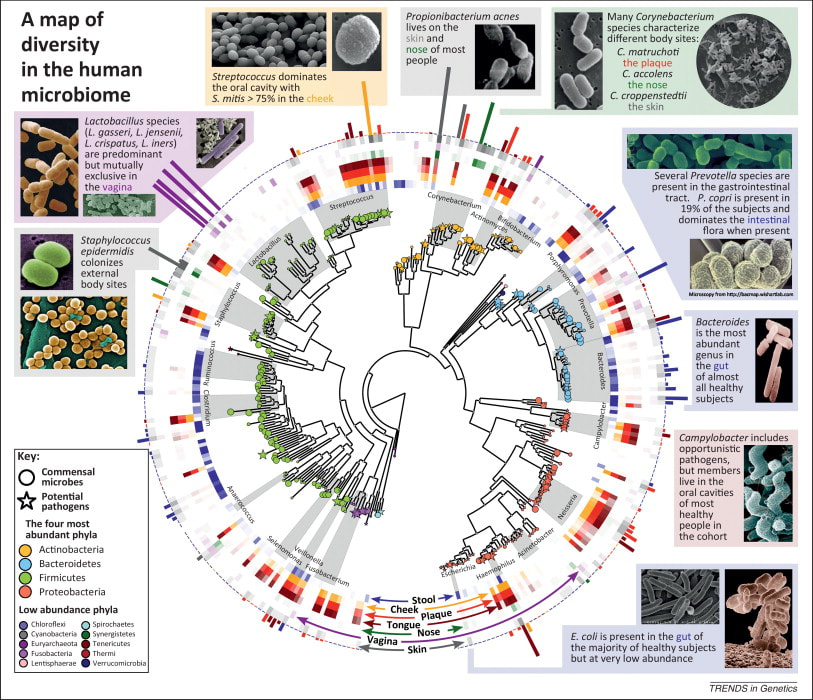|
Recent breakthrough studies have shone a light on the intriguing link between our microbiome – the diverse community of microorganisms residing in our gut and mouth – and the secret to a longer, healthier life. Scientists have long suspected that our genes, environment, and internal factors like the microbiome play a role in determining how long we live, but the specifics remained elusive. Now, thanks to cutting-edge research, we're getting closer to unraveling the mysteries of longevity. In this groundbreaking exploration, scientists employed a sophisticated approach called Mendelian randomization (MR) to delve into the intricate relationships between the human microbiome and longevity. By analyzing genetic data from large cohorts, they uncovered some compelling associations that shed light on the microbial players in the quest for a longer life. The Gut Chronicles: Microbial Superstars and CulpritsThe gut microbiome, a bustling metropolis of bacteria, has been a focal point in the quest for longevity. The study identified certain gut microbes as potential champions in the battle against aging. Microbial heroes like Coriobacteriaceae, Oxalobacter, and the probiotic Lactobacillus amylovorus were found to be positively linked to increased odds of longevity. On the flip side, a few gut microbes emerged as potential antagonists, with names like Fusobacterium nucleatum, Coprococcus, Streptococcus, Lactobacillus, and Neisseria negatively associated with longevity. These microbial foes might have a role in determining how gracefully we age. Oral Health: More Than Just a Pretty SmileThe study didn't stop at the gut; it extended its gaze to the oral microbiome, a less-explored but equally important realm. The findings suggested a fascinating connection between the oral microbiome and longevity. Specific oral bacteria were identified as potential influencers in the longevity game. Interestingly, the research hinted at a lower gut microbial diversity among centenarians (diversity appears to lower with age), but no significant difference in their oral microbiota. This finding underscores the importance of tracking the movements of these beneficial microbes across different parts of the body for a longer and healthier life. Decoding the Genetic Blueprint for LongevityThe study leveraged Mendelian randomization to unravel the causality between the microbiome and longevity. This approach, using genetic variants as tools, allowed scientists to explore the potential causal links between specific microbial features and the length of our lives. The bidirectional analyses provided a wealth of information, not only pinpointing specific microbes associated with longevity but also revealing the microbial preferences of genetically longevous individuals. For instance, genetic predisposition to longevity correlated with a higher abundance of Prevotella and a lower abundance of Bacteroides, suggesting a potential link between dietary choices and a longer life. Microbes and Diseases: Unraveling the We The study didn't just stop at longevity; it ventured into the realm of diseases. Certain microbes associated with longevity were found to have correlations with specific diseases. For example, Coriobacteriaceae, linked to longevity, was significantly reduced in patients with heart failure, suggesting a potential protective role against cardiovascular diseases. This "microbiota—disease—longevity" axis provides a nuanced understanding of how our microbial companions might influence not only our lifespan but also our susceptibility to various health conditions. What's Next in the Quest for a Longer LifeWhile the study opens exciting new avenues, there are some limitations to consider. The identified causalities didn't all reach statistical significance due to the vast number of microbial features tested. However, the robustness of the findings was supported by the replication of several identified causal links in independent datasets. Moving forward, researchers aim to collect more comprehensive individual-level data, including microbiome profiles, genetics, socio-economic factors, behaviors, and environmental influences. This holistic approach will help tease apart the individual contributions of these factors to longevity. In conclusion, this pioneering study, using Mendelian randomization, has provided us with a roadmap to explore the intricate connections between our microbiome and the quest for a longer, healthier life. As we unlock the secrets hidden in our genes and microbes, we inch closer to personalized approaches for healthy aging and interventions that could extend our time on this planet. referencesLiu, Xiaomin, et al. “Mendelian Randomization Analyses Reveal Causal Relationships between the Human Microbiome and Longevity.” Scientific Reports, vol. 13, no. 1, 29 Mar. 2023, p. 5127, www.nature.com/articles/s41598-023-31115-8, https://doi.org/10.1038/s41598-023-31115-8.
0 Comments
As it turns out, researchers have observed that positive emotions influence endocrinological and immunological responses. In other words, experiencing stressful emotions, such as anger, depression, anxiety, or a state of unworthiness, has the potential to actually pull the genetic trigger, dysregulating cells and creating disease. In 2005, a group of Japanese researchers conducted a study to examine what effect one's mental state might have on disease. The participants consisted of two groups of patients with type 2 diabetes, all of whom were dependent on insulin, a hormone that enables glucose to enter cells to be used as energy. Fasting blood-sugar levels for each group was determined to establish a baseline. The researchers then exposed one of the groups to a comedy show for an hour, while the control group watched a boring lecture. Afterwards, both groups were instructed to consume food, after which their blood-sugar levels were checked again. Of the groups, there was a significant difference between those who watched the comedy show compared to those who viewed the lecture. The researchers measured the blood-sugar levels of those who watched the lecture and observed an average of 123 mg/dl - high enough that they would be required to take insulin. In the group that watched the comedy show, their postprandial blood-sugar levels rose only about half of that amount. The researchers set out to examine the mechanism for why this may be occurring. Initially, they hypothesized that the group experiencing laughter resulting in more time contracting their diaphragm and abdominal muscles, expending more energy, therefore resulting in the lower blood-glucose levels. Upon greater examination, the researchers analyzed the changes in expression of 18,716 genes from blood cells in the patients with type 2 diabetes, which were induced by laughter. Of the 18,716 genes, 23 genes showed significantly different expression changes after listening to the comic story compared to the boring lecture. Eight were relatively upregulated and 15 were downregulated 1.5 hours after the laughter occurred. As it turns out, of the group that experienced laughter, their elevated mental states apparently triggered their brains to send new chemical signals to their cells, activating the genetic sequences to allow their bodies to naturally begin regulating the genes responsible for processing blood sugar. In sum, the researchers demonstrated simply signaling the body with a positive emotion, such as laughter, is linked to gene expression. Emotions are capable of altering body chemistry and signaling new genes, altering their internal environment. And remember, we can create an emotion by thought alone. References Hayashi, T., Urayama, O., Kawai, K., Hayashi, K., Iwanaga, S., Ohta, M., Saito, T. and Murakami, K. (2005). Laughter Regulates Gene Expression in Patients with Type 2 Diabetes. Psychotherapy and Psychosomatics, 75(1), pp.62-65. https://doi.org/10.1159/000089228
|
The Awareness domain contains research, news, information, observations, and ideas at the level of self in an effort to intellectualize health concepts.
The Lifestyle domain builds off intellectual concepts and offers practical applications.
Taking care of yourself is at the core of the other domains because the others depend on your health and wellness.
Archives
May 2024
Categories
All
|



 RSS Feed
RSS Feed

